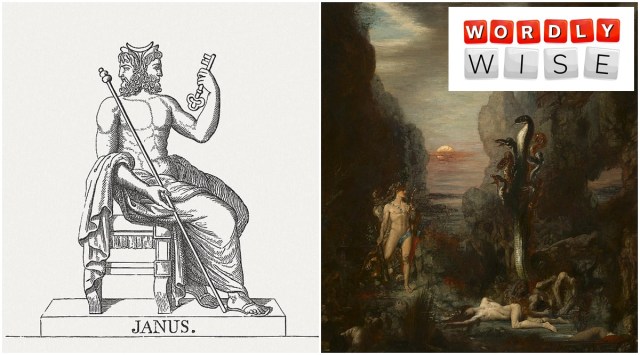English words from Greek and Roman mythology: How many do you know?
One report last week said, “Pervez Musharraf leaves behind a janus-faced legacy” when Pakistan's former President died. Have you ever come across a 'Janus-faced' person, and had to remain 'argus-eyed' to guard against them? How have these words originated?
 (Left) Janus, the Roman god of beginnings; Hercules and the Lernaean Hydra by Gustave Moreau. (Photos: Wikimedia Commons)
(Left) Janus, the Roman god of beginnings; Hercules and the Lernaean Hydra by Gustave Moreau. (Photos: Wikimedia Commons) The death of former Pakistan President General Pervez Musharraf in Dubai last Sunday garnered a lot of media attention for obvious reasons. He was the first military ruler of the neighbouring country to receive capital punishment. The sentence was later withdrawn and he was allowed to live in exile.
Known as the architect of the Kargil War in 1999, he was also declared a fugitive in the Benazir Bhutto assassination case. His subterfuge of sheltering Osama bin Laden on Pakistani soil while keeping the friendly façade with the US is well-known. He had a love-hate relationship with India.
While going through reports on his death, I came across two particularly interesting words with equally interesting etymologies. One report said, “Pervez Musharraf leaves behind a janus-faced legacy”. Another was titled “Man who played many roles, from a dictator to a pariah”.
Greek and Roman myths often come in handy to make an apt reference or comparison. Janus-like is one such expression. Janus was the Roman god of beginnings (and that’s why the first month of the year is January) and also portals, gateways and doors (the word ‘janitor’ has this origin). He was represented with two faces looking in opposite directions to illustrate his power of seeing both past and future.
The words Janus, Janus-faced and Janus-like may be non-committal to mean looking in two directions. They may have a positive connotation indicating versatility or contrasting abilities. And they may also be negative in connotation, in the sense of being deceitful.
While looking up Janus, I came across Cyclops. In the Greek epic The Odyssey, they are giants with a single round (cycl) eye (ops) in the middle of the forehead. From this comes the adjective cyclopean, meaning huge, or massive. The term is used in architecture where huge blocks of stone are placed on each other without cement.
Then there was Argus, a monster with a hundred eyes, some of which never closed. He, therefore, served as a watchman. Hence, argus-eyed means vigilant, ever-awake and observant.
One of the tasks of Hercules, a Greco-Roman hero, while doing penance for killing his wife and children, was to get rid of The Lernaean Hydra, a water monster who had nine heads. However, as one head was cut off, two new ones replaced it. Hercules finally eliminated the monster with the help of an assistant who would immediately put on fire the amputated part. So, hydra-headed means hard to eliminate or destroy. The term is also applied to a condition or an evil, which is put down in one place and springs up in another. Or else, it may mean having many centres or branches, multifarious.
The origin of the pariah is closer to home. But its modern-day usage in English has grown out of a typical lack of understanding of colonisers of a complex society like ours. The word is the anglicised form of Tamil ‘paraiyar’, which refers to the caste of traditional drummers. Inhabiting states like Tamil Nadu, Kerala and Andhra Pradesh, the people belonging to this caste have lived in the lower strata of society. Today they are a politically powerful group. In that sense, pariah is a rather monochromatic coinage to mean an outcast, a person rejected by society.
Remember juggernaut, derived from Jagannath, the benevolent god. Ironically, it means a crushing, brute force. Another example of how the Englishmen could hardly make sense of the people and society of the land they occupied.
Wordly Wise is a weekly column by Amitabh Ranjan published every Saturday in the Explained section. Please tweet your feedback to @ieexplained



- 01
- 02
- 03
- 04
- 05



































